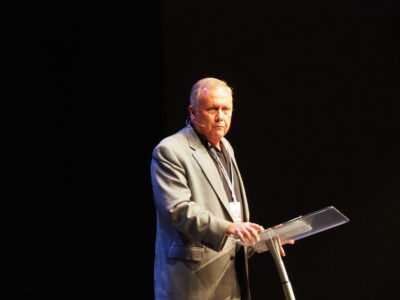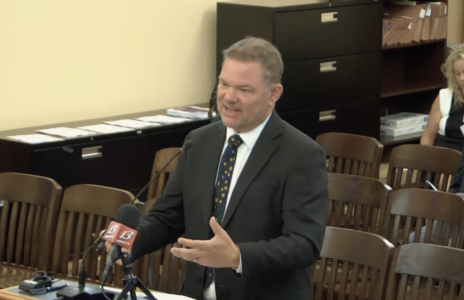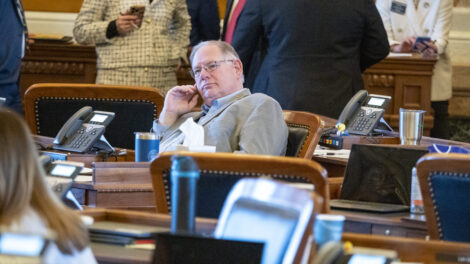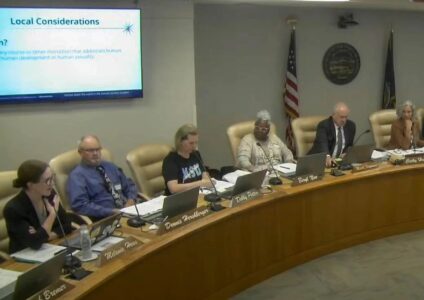Kansas Senate President Ty Masterson launches Republican campaign for governor
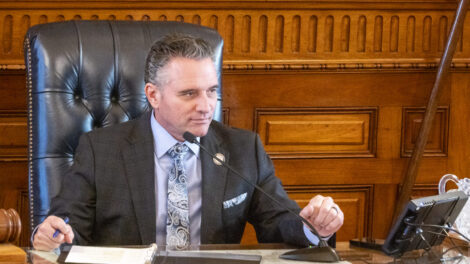
photo by: Sherman Smith/Kansas Reflector
Senate President Ty Masterson, R-Andover, presides over deliberations in the Kansas Senate.
TOPEKA — Kansas Senate President Ty Masterson on Sunday became the latest prominent Republican to plunge into the 2026 campaign for governor.
Masterson, who has held the top leadership post in the state Senate since 2021, joined a field of candidates that included Secretary of State Scott Schwab, Insurance Commissioner Vicki Schmidt and former Gov. Jeff Colyer. They GOP primary is set for August 2026. Democratic Gov. Laura Kelly can’t seek a third term.
“Tangling with Laura Kelly these last few years has taught me I can only do so much from the position I’m in,” Masterson said in an announcement video. “Big change comes from the big seat. It’s time to take the fight to the status quo.”
In the video, Masterson took credit for work in the Legislature on a $2 billion reduction in state taxes and improvements to election security. He said he advanced bills forbidding transgender health care for minors and blocking transgender individuals from taking part in sports teams designated for girls or women. He said he devoted himself to getting the “woke ideology off our college campuses.”
He said Kansas needed a governor capable of reducing property taxes, lowering crime and addressing excessive spending by state government.
“President Trump is breaking the ice dam on the federal bureaucracy,” Masterson said. “We need to take advantage of this amazing opportunity to bring the Kansas economy roaring back and prevent things that are holding us back.”
Masterson, 55, of Andover, has served in the Kansas Senate since 2009 and previously was a member of the Kansas House. He was reelected to another four-year Senate term in 2024 while earning 65% of the vote in his district. That meant he could run for statewide office in 2026 without giving up his seat in the Legislature.
Schwab, the secretary of state and a former member of the Kansas House, greeted Masterson’s announcement by saying Kansas voters deserved “a robust airing of the issues that face our state that the next governor will have to address.” Schwab said Republicans had to nominate a candidate capable of winning.
Masterson has sought to be a conservative counterpoint to Kelly’s vision of centrist governance by mustering votes to override her vetoes, expanding state regulation of abortion and opposing broadening access to Medicaid health services for lower-income Kansans.
The Senate president endorsed diversion of state tax dollars to private education and championed placement on 2026 ballots an amendment to the Kansas Constitution that would allow direct election of Kansas Supreme Court justices. He advocated replacing the state’s three-tier income tax structure with a single tax rate regardless of income. Kansas has adopted a two-rate system.
Masterson placed significance on deepening the Republican supermajority in the House and Senate to help blunt Kelly’s policy agenda. Before the 2025 session of the Legislature, he also collaborated with House Speaker Dan Hawkins of Wichita to reduce Kelly’s influence over state budget recommendations.
At the same time, Masterson has spoken about his ability to work collaboratively with the Democratic governor.
“While we’ve certainly had our differences, I’ve been pleased with our ability to work together across an array of issues,” he said in a January rebuttal to Kelly’s State of the State speech to the Legislature. “While the controversial differences certainly garner the most headlines, the vast majority of our work is bipartisan in nature, and that’s a good thing.”
In that speech, he celebrated election of Trump in 2024 and viewed the president’s victory in Kansas as a mandate to “put Kansans first, control the overreach of government and keep our promises.” Masterson said that included a pledge to lower property taxes. “For too long it’s just been a political talking point,” he said.
During the 2024 and 2025 legislative sessions, however, the GOP leadership placed emphasis on reducing state income taxes and eliminating the state’s sales tax on groceries.


